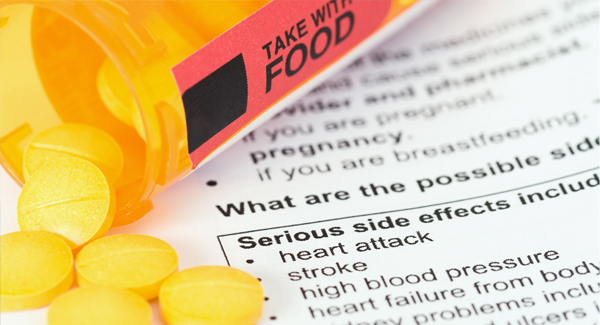Common Pain Relievers Carry Risks
Beware interactions, overdose from over-the-counter medications.
Mary Anne Dunkin | Nov. 18, 2021
If you regularly or even occasionally turn to over-the-counter (OTC) pain relievers to help take the edge off your arthritis pain, it’s important to consider any other medications you take. Even though nonsteroidal anti-inflammatory drugs (NSAIDs) like ibuprofen (Advil, Motrin) and naproxen (Aleve) and the analgesic acetaminophen (Tylenol) are easy to access without a prescription, they still carry risks of side effects. And, importantly, they have the potential to interact with other OTC or prescription medicines, says Donald Miller, PharmD, professor in the Department of Pharmacy Practice at North Dakota State University.
They may alter or interfere with drugs you are taking in some cases. And if they contain the same or similar ingredients to your meds, taking them sets you up for potential overdose.
The risks depend on a number of factors, including the person’s health and other conditions as well as the medication dose — lower OTC doses generally are less likely to cause problems than higher prescription doses.
Nevertheless, Miller says, it’s important to be aware of possible interactions before you reach for an over-the-counter NSAID. Talk to your doctor or pharmacist to clear up any concerns or questions, and always tell your doctor if you use OTC pain relievers or other medications or supplements to help prevent reactions and side effects.
NSAIDs
Two NSAIDs — ibuprofen and naproxen — are available OTC. If you are already taking a prescription NSAID, adding either of these could lead to an overdose. This is also a risk if you take one of the many cold and headache preparations containing an NSAID to reduce aches and fever. Symptoms of an overdose can range from blurred vision and low blood pressure to kidney or liver damage. Always check the labels.
OTC NSAIDs also have the potential to interact with:
- Blood thinners: Taking NSAIDs if you take blood-thinning drugs, such as aspirin or warfarin (Coumadin), could increase your chances of dangerous bleeding.
- Blood pressure medication: Taking NSAIDs along with blood pressure medicines such as beta blockers [acebutolol, atenolol (Tenormin), metoprolol (Lopressor) and others], angiotensin-converting-enzyme (ACE) inhibitors and calcium antagonists [benazepril (Lotensin), captopril (Capoten) and others] or calcium channel blockers [amlodipine (Norvasc), felodipine (Plendil) and others] may interfere with their effects and ability to control your blood pressure.
- Diuretics: If you take a diuretic, such as furosemide (Lasix), adding an NSAID could decrease the drug’s effectiveness and increase fluid retention.
- Selective serotonin reuptake inhibitors (SSRIs): A class of antidepressants often used to treat fibromyalgia, SSRIs can increase bleeding risk by interfering with platelet adhesion. Taking an NSAID along with an SSRI can substantially increase that risk.
- Methotrexate: Taking NSAIDs along with methotrexate can slow the clearance of methotrexate, potentially allowing dangerous levels to build in the blood. Miller says this is uncommon for people taking the low doses of methotrexate used to treat rheumatoid arthritis; nonetheless, blood tests are generally needed to monitor this potential interaction.
- Corticosteroids: Both NSAIDs and corticosteroids, such as prednisone, can increase the risk of stomach upset and ulcers. Combining the two further increases the risk.
Acetaminophen
Acetaminophen is used to ease arthritis and other pain, and it’s a common ingredient in cold medications. It is also available as a prescription combined with narcotic analgesics. Getting acetaminophen from one than more source can lead to an overdose and potentially serious liver damage. If you have liver disease or drink alcohol heavily, you should not take acetaminophen without your doctor’s OK.
Acetaminophen also has the potential to interact with the following:
- Leflunomide: Both acetaminophen and leflunomide (Arava), a medication used to treat rheumatoid arthritis, can affect the liver. Taking them together can compound the effect. Your doctor will need to monitor your enzymes, says Miller.
- Methotrexate: As with NSAIDs, acetaminophen may inhibit the clearance of methotrexate, allowing the drug to build up in the body. Regular monitoring is important if you combine the two.
- Blood thinners: Although the effect is much less than with NSAIDs, acetaminophen may increase your risk of bleeding when taken with warfarin or other blood thinners. Your doctor will need to monitor you frequently says Miller.
The bottom line is that dangerous interactions can occur even when taking seemingly innocuous OTC medications, Miller says. “It’s important to disclose OTC drugs with your doctor or pharmacist and work with them to make sure you manage any potential problem.”
Stay in the Know. Live in the Yes.
Get involved with the arthritis community. Tell us a little about yourself and, based on your interests, you’ll receive emails packed with the latest information and resources to live your best life and connect with others.


